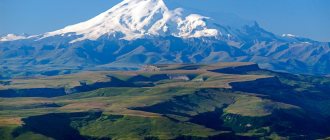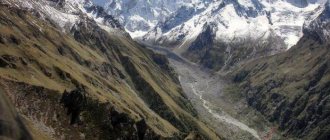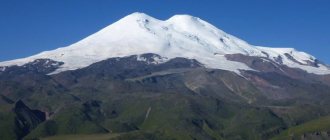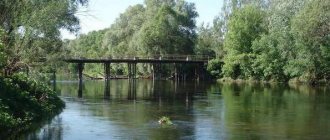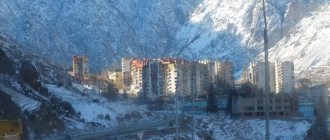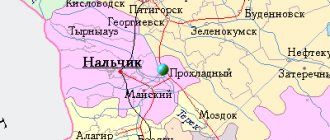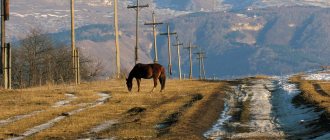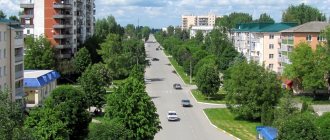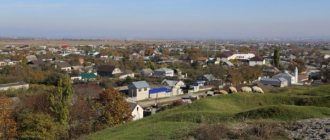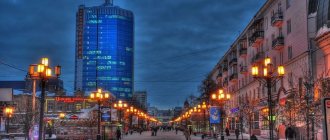For other places with the same name, see Baksan (locality).
City in Kabardino-Balkaria, Russia
| Baksan Baksan | |
| City [1] | |
| Baksan Central Mosque | |
| Coat of arms | |
| Location of Baksan | |
| Baksan Location of Baksan Show map of Russia Baksan Baksan (Kabardino-Balkaria) Show map of Kabardino-Balkaria | |
| Coordinates: 43°40′57″N 43°32′02″E / 43.68250°N 43.53389°E / 43.68250; 43.53389 Coordinates: 43°40′57″N 43°32′02″E / 43.68250°N 43.53389°E / 43.68250; 43.53389 | |
| A country | Russia |
| Federal subject | Kabardino-Balkaria [1] |
| Based | 1822 |
| City status from | 1967 [2] |
| Height | 450 m (1480 ft) |
| Population (2010 Census) [3] | |
| • General | 36 860 |
| • Evaluate (2018) [4] | 38 192 ( + 3,6% ) |
| Administrative status | |
| • Subordinate | city of republican significance Baksan [1] |
| • Capital from | Baksan district [1], city of republican significance Baksan [1] |
| Municipal status | |
| • Urban district | Baksan urban district [5] |
| • Capital from | Baksan municipal district [5], Baksan urban district [5] |
| Timezone | UTC+3 (MSK[6]) |
| Postal code [7] | 361530–361536, 361538 |
| Dialing code(s) | +7 86634 |
| OKTMO ID | 83703000001 |
| Web site | www.gb.adm-kbr.ru |
Baksan
(Russian: Baksan) (Adyge: Bekh'seno) is a city in the Kabardino-Balkarian Republic, Russia, located 24 kilometers (15 mi) northwest of Nalchik on the left bank of the Baksan River (Terek's basin). Population: 36,860 (2010 census); [3] 35,805 (2002 census); [8] 28,767 (1989 census). [9]
Geographical position
The river flows in the European part of Russia on the territory of the Kabardino-Balkarian Republic. Baksan is one of the mountain reservoirs of the Western Caspian Basin District. The area of its basin is 6800 km2 and is shaped like a triangle, elongated in a northeast direction.
The Baksan River is part of a large water system that is displayed on the map. It flows into the Malka on the right, near the city of Prokhladny, which carries water to the Terek, which, in turn, rushes into the Caspian Sea.
Education
- Progymnasium No. 1 - st. Ugnich, 1
- Progymnasium No. 2 - st. Revolutionary, 1
- Progymnasium No. 3 - st. Budyonny, 93
- Secondary school No. 1 - st. Shukova, 1
- Secondary school No. 2 - st. Beslaneeva, 7
- Secondary school No. 3 - st. Krasnoarmeyskaya, 49
- Secondary school No. 4 - st. Panayoti, 177
- Secondary school No. 5 - st. Shukova, 1
- Secondary school No. 6 - st. Ugnich, 2
- Secondary school No. 7 - st. Baksanskaya, 162
- Secondary school No. 8 - st. Apanasova, 65
- Secondary school No. 9 - st. 60th anniversary, 250
- Secondary school No. 10 - st. Ivanova, 9
There are also 7 preschool institutions in the city.
Etymology of the name
Karachais and Balkars.
According to ancient sources, the river once bore the name Altud. Subsequently, it was named in honor of the princely son Bashan, who died here, on the rocky shores, along with his brothers at the hands of enemies. Her own sister mourned her brothers and buried them in the mountains, and in memory of this, the raging streams of Altuda were renamed Baksan.
According to another version, the river received its name for its noisy character; translated from Kabardian, its name means “foamed drink,” where “bahe” means steam and “sane” means wine. From the Kabardian-Circassian language “baksan” is translated as “flooding”.
We recommend reading: what kind of river is in Lipetsk.
Excerpt characterizing Baksan (city)
- And what a beauty! Thank you, my dear! He took out several gold pieces from his trouser pocket and placed them on her plate. - Well, how are you living? - said Kutuzov, heading towards the room reserved for him. Popadya, smiling with dimples on her rosy face, followed him into the upper room. The adjutant came out to Prince Andrei on the porch and invited him to have breakfast; Half an hour later, Prince Andrei was called again to Kutuzov. Kutuzov was lying on a chair in the same unbuttoned frock coat. He held a French book in his hand and, at Prince Andrei’s entrance, he laid it with a knife and rolled it up. It was “Les chevaliers du Cygne”, the composition of Madame de Genlis [“Knights of the Swan”, Madame de Genlis], as Prince Andrei saw from the wrapper. “Well, sit down, sit here, let’s talk,” said Kutuzov. - It's sad, very sad. But remember, my friend, that I am your father, another father... - Prince Andrei told Kutuzov everything he knew about the death of his father, and about what he saw in the Bald Mountains, driving through them. - What... what have they brought us to! - Kutuzov suddenly said in an excited voice, obviously having clearly imagined, from the story of Prince Andrei, the situation in which Russia was. “Give me time, give me time,” he added with an angry expression on his face and, obviously not wanting to continue this conversation that worried him, said: “I called you to keep you with me.” “I thank your lordship,” answered Prince Andrey, “but I’m afraid that I’m no longer fit for headquarters,” he said with a smile, which Kutuzov noticed. Kutuzov looked at him questioningly. “And most importantly,” added Prince Andrei, “I got used to the regiment, fell in love with the officers, and the people, it seems, loved me.” I would be sorry to leave the regiment. If I refuse the honor of being with you, then believe me... An intelligent, kind and at the same time subtly mocking expression shone on Kutuzov’s plump face. He interrupted Bolkonsky: “I’m sorry, I would need you; but you're right, you're right. This is not where we need people. There are always many advisers, but no people. The regiments wouldn’t be the same if all the advisers served there in regiments like you. “I remember you from Austerlitz... I remember, I remember, I remember you with the banner,” said Kutuzov, and a joyful color rushed into Prince Andrei’s face at this memory. Kutuzov pulled him by the hand, offering him his cheek, and again Prince Andrei saw tears in the old man’s eyes. Although Prince Andrei knew that Kutuzov was weak to tears and that he was now especially caressing him and feeling sorry for him out of a desire to show sympathy for his loss, Prince Andrei was both joyful and flattered by this memory of Austerlitz. - Go your way with God. I know your path is a path of honor. – He paused. “I felt sorry for you in Bukarest: I should have sent you.” - And, changing the conversation, Kutuzov began to talk about the Turkish war and the concluded peace. “Yes, they reproached me a lot,” said Kutuzov, “both for the war and for the peace... but everything came on time.” Tout vient a point a celui qui sait attendre. [Everything comes on time for someone who knows how to wait.] And there were no fewer advisers there than here... - he continued, returning to the advisers who apparently occupied him. - Oh, advisers, advisers! - he said. If we had listened to everyone, we would not have concluded peace there, in Turkey, and we would not have ended the war. Everything is quick, but quick things take a long time. If Kamensky had not died, he would have disappeared. He stormed the fortress with thirty thousand. Taking a fortress is not difficult, but winning a campaign is difficult. And for this you don’t need to storm and attack, but you need patience and time. Kamensky sent soldiers to Rushchuk, and I sent them alone (patience and time) and took more fortresses than Kamensky, and forced the Turks to eat horse meat. – He shook his head. - And the French will be there too! “Believe my word,” said Kutuzov, inspired, hitting himself on the chest, “they will eat my horse meat!” “And again his eyes began to blur with tears. - However, before the battle will have to be accepted? - said Prince Andrei. - It will have to be, if everyone wants it, there is nothing to do... But, my dear: there is nothing stronger than those two warriors, patience and time; they will do everything, but the advisers n'entendent pas de cette oreille, voila le mal. [they don’t hear with this ear—that’s what’s bad.] Some want it, others don’t want it. What to do? – he asked, apparently expecting an answer. - Yes, what do you tell me to do? - he repeated, and his eyes sparkled with a deep, intelligent expression. “I’ll tell you what to do,” he said, since Prince Andrei still did not answer. – I’ll tell you what to do and what I’m doing. Dans le doute, mon cher,” he paused, “abstiens toi, [In doubt, my dear, refrain.],” he said with emphasis. - Well, goodbye, my friend; remember that with all my soul I bear your loss with you and that I am not your Serene Highness, not a prince or commander-in-chief, but I am your father. If you need anything, come straight to me. Goodbye, my dear. “He hugged and kissed him again. And before Prince Andrei even had time to walk out the door, Kutuzov sighed reassuringly and took up Madame Genlis’s unfinished novel “Les chevaliers du Cygne” again. How and why this happened, Prince Andrei could not explain in any way; but after this meeting with Kutuzov, he returned to his regiment reassured about the general course of the matter and about who was entrusted with it. The more he saw the absence of everything personal in this old man, in whom there seemed to be only the habits of passions and instead of the mind (grouping events and drawing conclusions) only the ability to calmly contemplate the course of events, the more calm he was that everything would be as it was. there should be. “He won’t have anything of his own. “He won’t come up with anything, won’t do anything,” thought Prince Andrei, “but he will listen to everything, remember everything, put everything in its place, won’t interfere with anything useful and won’t allow anything harmful.” He understands that there is something stronger and more significant than his will - this is the inevitable course of events, and he knows how to see them, knows how to understand their meaning and, in view of this meaning, knows how to renounce participation in these events, from his personal waves aimed at other. And the main thing,” thought Prince Andrey, “why you believe him, is that he is Russian, despite the novel Zhanlis and French sayings; this is that his voice trembled when he said: “What have they brought to this!”, and that he began to sob, saying that he would “force them to eat horse meat.” It was on this same feeling, which everyone more or less vaguely experienced, that the unanimity and general approval that accompanied the popular election of Kutuzov as commander-in-chief, contrary to court considerations, was based. After the departure of the sovereign from Moscow, Moscow life flowed in the same, usual order, and the course of this life was so ordinary that it was difficult to remember the former days of patriotic enthusiasm and enthusiasm, and it was difficult to believe that Russia was really in danger and that the members of the English Club were together with that, the sons of the fatherland, ready for any sacrifice for him. One thing that was reminiscent of the general enthusiastic patriotic mood that existed during the sovereign’s stay in Moscow was the demand for donations of people and money, which, as soon as they were made, took on a legal, official form and seemed inevitable. As the enemy approached Moscow, the Muscovites’ view of their situation not only did not become more serious, but, on the contrary, became even more frivolous, as is always the case with people who see a great danger approaching. When danger approaches, two voices always speak equally strongly in a person’s soul: one very reasonably says that a person should consider the very nature of the danger and the means to get rid of it; another says even more wisely that it is too difficult and painful to think about danger, whereas it is not in the power of man to foresee everything and save himself from the general course of affairs, and therefore it is better to turn away from the difficult, until it comes, and think about the pleasant. In solitude, a person mostly gives himself to the first voice, in society, on the contrary, to the second. So it was now with the residents of Moscow. It's been a long time since we had as much fun in Moscow as we did this year. Rastopchinsky posters with the image at the top of a drinking house, a kisser and a Moscow tradesman Karpushka Chigirin, who, having been in the warriors and having drunk an extra hook on a poke, heard that Bonaparte wanted to go to Moscow, got angry, scolded all the French with bad words, left the drinking house and spoke under the eagle to the assembled people, read and discussed along with the last burima of Vasily Lvovich Pushkin. In the club, in the corner room, they were going to read these posters, and some liked how Karpushka made fun of the French, saying that they would bloat from cabbage, they would burst from porridge, they would suffocate from cabbage soup, that they were all dwarfs and that one woman would throw a pitchfork at the three of them . Some did not approve of this tone and said that it was vulgar and stupid. They said that Rostopchin expelled the French and even all foreigners from Moscow, that there were spies and agents of Napoleon among them; but they told this mainly in order to convey on this occasion the witty words spoken by Rostopchin upon their departure. The foreigners were sent on a barque to Nizhny, and Rastopchin told them: “Rentrez en vous meme, entrez dans la barque et n'en faites pas une barque ne Charon.” [come into yourself and into this boat and try so that this boat does not become Charon’s boat for you.] They said that they had already expelled all public places from Moscow, and they immediately added Shinshin’s joke that for this alone Moscow should be grateful to Napoleon . They said that his regiment would cost Mamonov eight hundred thousand, that Bezukhov spent even more on his warriors, but that the best thing about Bezukhov’s action was that he himself would dress in a uniform and ride on horseback in front of the regiment and would not take anything for places from those who will look at him. “You’re not doing anyone any favors,” said Julie Drubetskaya, collecting and pressing a pile of plucked lint with thin fingers covered with rings. Julie was getting ready to leave Moscow the next day and was having a farewell party. - Bezukhov is est ridicule [ridiculous], but he is so kind, so sweet. What pleasure is it to be so caustique [evil-tongued]? - Fine! - said a young man in a militia uniform, whom Julie called “mon chevalier” [my knight] and who was traveling with her to Nizhny. In Julie's society, as in many societies in Moscow, it was expected to speak only Russian, and those who made mistakes when speaking French paid a fine in favor of the donations committee. “Another fine for Gallicism,” said the Russian writer who was in the living room. – “The pleasure of being not in Russian. “You don’t do anyone any favors,” Julie continued to the militiaman, not paying attention to the writer’s remark. “I’m to blame for the caustique,” she said, “and I’m crying, but for the pleasure of telling you the truth I’m ready to pay more; I’m not responsible for Gallicisms,” she turned to the writer: “I have neither the money nor the time, like Prince Golitsyn, to take a teacher and study in Russian.” “Here he is,” said Julie. “Quand on... [When.] No, no,” she turned to the militia, “you won’t catch me.” “When they talk about the sun, they see its rays,” said the hostess, smiling kindly at Pierre. “We were only talking about you,” Julie said with the freedom of lies characteristic of secular women. “We said that your regiment will probably be better than Mamonov’s.” “Oh, don’t tell me about my regiment,” answered Pierre, kissing his hostess’s hand and sitting down next to her. - I'm so tired of him! – Surely you will command it yourself? – said Julie, slyly and mockingly exchanging glances with the militiaman. The militiaman in the presence of Pierre was no longer so caustique, and his face expressed bewilderment at what Julie’s smile meant. Despite his absent-mindedness and good nature, Pierre’s personality immediately stopped all attempts at ridicule in his presence.
General characteristics
Originating on the southern and southeastern slopes of Elbrus at an altitude of 2340 meters above sea level, the Baksan River extends 169 km in length. This is the second longest water artery of Kabardino-Balkaria after Malka.
We recommend reading: Oka (Sayan) River on the map of the Irkutsk region, rafting and fishing
Mode and nutrition
Baksan River.
Flood. Noisy, fast water with boiling white foam always remains cold, its temperature ranges from +6 to +12.
In winter, Baksan freezes only near the shores, because the fast current prevents freeze-up.
The river has a mixed type of nutrition. In mountainous areas it is replenished by melting glaciers. Near the village of Zayukovo, the rocky landscape gives way to a plain, and the river is fed by underground streams.
Flood occurs in the summer months from May to August. If the flood coincides with heavy rains, then natural disasters occur in the region. The river overflows its banks, flooding the only route to Tereskol from Nalchik and Pyatigorsk. The overflow of the obstinate Baksan River is blocking roads to the highest peak in Russia and Europe - Elbrus, and the interior areas are left without transport links.
Description from source to mouth
The Great Azau glacier is the source of the Baksan. In the upper reaches the river is called Azau. At the beginning of the journey, in the mountains, water rushes from a height of 70 meters and fills the surroundings with incredible noise and roar.
In the upper reaches, the river flows through the Baksan Gorge, cutting through three ridges: Skalisty, Cretaceous and Bokovoy, and at the same time picks up many stones, snags and boulders, creating impassable areas. Almost every kilometer of the route there are rapids and waterfalls.
On the Kabardian and Baksan plains, piles of boulders alternate with very short calm areas.
Immediately before Tyrnyauz, the valley decreases quite sharply, and a gorge appears in front of us - Eldzhurtu. The narrowest place on the way.
The largest of the rapids are located in the area between two tributaries - Gizhgit and Gundelen.
Near the village of Atazhukino, the river reaches a plane and turns into a quiet surface with gentle banks, where it begins to divide into branches.
Tributaries
The Baksan Mountains are replenished by countless tributaries, they run down from the icy peaks of Elbrus, the Caucasian and Main ranges:
- Irik.
- Kyrtyk.
- Adilsu.
- Yusengi.
- Kestants.
- Adyrsu.
- Tyutus.
- Gerkhozhansu.
We recommend reading: The Yenisei River: where it is, source, width, depth, length, where it flows
The largest of them - Gundelen - joins near the village of Zayukovo. Closer to Malka, where the Baksan River flows, Chegem and Cherek join.
Settlements
Tyrnyauz city.
Kabardians have been living on the banks of the river since the beginning of the 16th century. This is evidenced by the fact that seven out of ten fortresses located in Kabardino-Balkaria were built in the Baksan valley. Today there are three cities located near the river:
- Tyrnyauz.
- Baksan.
- Chill.
There are also smaller settlements:
- Baidaevo.
- Elbrus.
- Neutrino.
- Upper Baksan.
- Bygone.
- Lashkuta.
- Zhankhoteko.
- Zayukovo.
- Atazhukino.
- Islamey.
- Dygulybgey.
- Kishpek and others.
Fauna
Central Asian leopard.
The inhospitable, seething and muddy water of Baksan sheltered a small amount of fish. Both commercial species and small inhabitants of the rapids live here: barbel, chub, carp, black belly and podust.
In the lower reaches of the river there is a healthy yellow trout, which every year attracts a large number of fans of sport fishing.
Some animals of the Baksan Valley: the Central Asian leopard, the Caucasian otter, the European mink, the ferret, the bustard, and the little bustard are on the verge of extinction.
Fishing on the river
The river is home to trout, barbel, podust, chub, and carp.
These are well-known representatives of the ichthyofauna in Russia, which are popular among fishermen at almost all latitudes of the country where they live. For those who need something exclusive, Kabardino-Balkaria also has its own fishing charm - mountain brook trout and such strong and lively fish that live in the fast-moving rivers of the republic as barbel and black belly.
Fish and fishing
As for fishing, many fish on the river, because it is a pleasure from the process itself, as well as the beautiful surrounding nature. The Baksan River is considered promising for fishing. It is inhabited by various fish, mainly tench, crucian carp, carp, bream, podust and chub. There is also the opportunity to catch rarer species of fish - barbel and trout. These are lively inhabitants of cold rivers with fast currents.
Many tourists are attracted by the exciting fishing of barbel. The lower reaches of the river are considered an excellent and successful place. In this place, small fish such as black belly are also well caught. It has surprisingly tasty meat, and sizes vary from 10 to 30 cm.
Fishing on the Baksan River is possible at any time of the year, since the water does not freeze even in winter. You can actively combine relaxation and morning or evening fishing.
Attractions
The most significant objects of Kabardino-Balkaria, known to many tourists, skiers and rock climbers, are located on the Baksan River. So, in its upper reaches there are several mountaineering camps: “Baksan”, “Dzhan-Tugan”, “Elbrus” and others. It is from here that they set off to conquer the highest mountain peak in Russia. Instructors have developed more than 50 climbing routes, which are mastered by thousands of extreme sports enthusiasts every year.
We recommend reading: Tom River: map, source, where the river is located and where it flows
At an altitude of 3,150 meters, near the village of Terskol, there is the famous international astronomical observatory “Terskol Peak”, built in the early 80s of the 20th century. It conducts scientific research on the Sun, giant planets, comets, and near-Earth asteroids.
The river carries water through the territory of the Elbrus National Park, where much attention is paid to the protection of the natural habitat of animals, including the protection of the river reservoir.
Baksan hydroelectric power station
Baksan hydroelectric power station.
Even at the beginning of the 20th century, people began to think about how to channel rapid flows into a creative direction.
In the 1930s, the Baksan hydroelectric power station appeared in the village of Atazhukino.
Today it is one of the oldest hydroelectric power plants in Russia.
The hydroelectric power station was repeatedly destroyed. So, during the Great Patriotic War it suffered greatly. But, given the important strategic importance for the region, in the post-war period the object was restored in a short time. Already in the early 50s, the hydroelectric power station was fully automated.
On July 21, 2010, a terrorist attack was organized at the station. Early in the morning, a group of armed militants carried five explosive devices into the building. As a result of the fire, two hydro generators and a control system were damaged.
By December 2012, it was completely restored and reconstructed.
Links[edit]
Notes[edit]
- ^ abcdefg Law No. 12-RZ
- ^ ab Encyclopedia of Russian Cities
. Moscow: Great Russian Encyclopedia. 2003. p. 33. ISBN 5-7107-7399-9. - ^ a b Federal State Statistics Service (2011). All-Russian Population Census 2010. Volume 1 [All-Russian Population Census 2010, vol. 1]. All-Russian Population Census 2010 [All-Russian Population Census 2010] (in Russian). Federal State Statistics Service.
- "26. The size of the permanent population of the Russian Federation by municipalities as of January 1, 2021". Federal State Statistics Service. Retrieved January 23, 2021.
- ^ abcd Law No. 13-RZ
- "On the Calculation of Time". Official Internet portal of legal information
. June 3, 2011. Retrieved January 19, 2021. - Post office. Information and computing center of OASU RPO. ( Post office
).
Search for postal service objects ( postal Search for objects
) (in Russian) - ↑
Federal State Statistics Service of Russia (May 21, 2004). The population of the Russian Federation, cities of the Russian Federation as part of federal districts, urban settlements, settlements, settlements, settlements is 3 thousand or more people. [Population of Russia, its federal districts , subjects of the Federation, districts, urban settlements, rural settlements - administrative centers and rural settlements with a population of more than 3000 people] (XLS). All-Russian Population Census of 2002 [All-Russian Population Census of 2002] (in Russian). - All-Union Population Census of 1989 Population of Union and Autonomous Republics, Autonomous Regions and Districts, Territories, Regions, Urban Settlements and Village District Centers [All-Union Population Census of 1989: Current Population of Union and Autonomous Republics, Autonomous Regions and Districts, Territories, Regions , districts, urban settlements and villages performing the functions of district administrative centers]. All-Union Population Census of 1989 [All-Union Population Census of 1989] (in Russian). Institute of Demography of the National Research University: Higher School of Economics [Institute of Demography of the National Research University: Higher School of Economics]. 1989 - via Demoscope Weekly
. - https://www.ethno-kavkaz.narod.ru/baksan02.html
Environmental data
Researchers characterize the pollution index of the Baksan River as moderate. Pollution increases from source to mouth. Scientists associate the presence of significant amounts of molybdenum and tungsten in the waters with the development of the Tyrnyauz polymer ore deposit.
Domestic discharges from the cities of Baksan and Tyrnyauz also have a detrimental effect on the river ecosystem. At discharge sites, there is an increased content of nitrogen and phosphorus compounds, which leads to water pollution, the development of harmful insect larvae and deterioration of human health.
The picturesque landscape, mountain air, snow-capped peaks of Elbrus and the unpredictable waters of Baksan will give tourists unforgettable emotions. You only have to plunge once into the world of pristine nature and feel harmony with it.
Mountain tourism
Due to its geographical location, the Baksan Valley has always attracted hundreds of tourists and mountain adventurers. These are mainly climbers trying to conquer the Elbrus peak. The Elbrus region is also popular among skiers. Episodes of the famous film “Vertical” with Vladimir Vysotsky were filmed in these places.
Dozens of alpine camps and tourist camps are formed annually along the banks of the Baksan River. And every year, employees of the Ministry of Emergency Situations have to rescue unlucky tourists due to spills.
Currently, the Elbrus region is actively developing as a ski resort and is one of the three most popular ski slopes in Russia.
There are excursions in the Baksan Valley; there are incredible and picturesque natural views. We can say that there is a year-round resort here.
